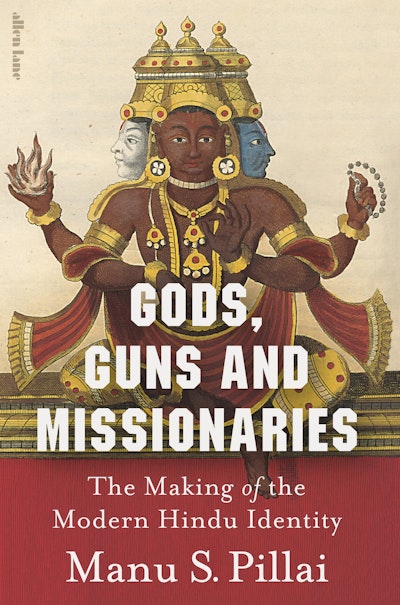- Published: 8 April 2025
- ISBN: 9780241456941
- Imprint: Allen Lane
- Format: Hardback
- Pages: 624
- RRP: $80.00
Gods, Guns and Missionaries
The Making of the Modern Hindu Identity
- Published: 8 April 2025
- ISBN: 9780241456941
- Imprint: Allen Lane
- Format: Hardback
- Pages: 624
- RRP: $80.00
A brave and magnificent book, and a vital intervention: as elegant as it is witty, as erudite as it is wise, and as stylish as it is scholarly. Manu Pillai is fast becoming one of India's most accomplished and impressively wide-ranging historians
William Dalrymple
A timely and decisive intervention in the contentious conversation around modern Hinduism, Gods, Guns and Missionaries takes the reader on a masterful journey that's enlightening and provocative in equal measure. Told with verve, confidence, and nuance, I struggled to put it down
David Veevers, author of The Great Defiance
Manu Pillai asks how Hinduism, perhaps the most ancient living tradition, came to be a modern identity. The luminous and often surprising account he offers tells us about the making of a Hindu self as part of a complex relationship between India and the world. A real achievement
Faisal Devji, Professor of Indian History, University of Oxford
A deft exploration of four centuries of Hinduism's often terse, sometimes violent and always complex relationship with other faiths, Gods, Guns and Missionaries explodes the myth of a singular, 'true' Hinduism [and] lays out the factors that allowed Hindu nationalists to forge a seemingly secular, muscular identity which has come to define Hinduism for many in the 21st century. Drawing on the lives of missionaries, maharajahs and men of the Dutch, French, and British East India Companies, Manu S Pillai builds the story of a system marked by adaptability, dynamism and compromise rather than ossified archaisms
Siddharth Venkataramakrishnan, Financial Times, The Best Books of the Week
Gods, Guns and Missionaries unpacks the transformation of Hinduism with sharp insight combined with masterful storytelling [and is] truly remarkable is its ability to speak to both sides of India’s modern ideological divide. Exploring the pressures of Mughal decline, missionary intervention, and colonial rule in the 400 years before Indian independence, Pillai examines how a tradition defined by its fluidity and flexibility began to crystallize into its modern form, often in response to external challenges … by tracing Hinduism’s evolution under colonial and missionary scrutiny, [he] provides valuable tools to understand the narratives underpinning contemporary Indian politics
Nishad Sanzagiri, Asian Review of Books
Gods, Guns and Missionaries presents a confident survey of encounters between Indians and Europeans from 1500 onward – five centuries of misunderstanding and mutual appreciation – taking in all the major cock-ups and flip-flops in colonial policy [while also making] a convincing case for the role of convent education in altering the world view of the lower orders.
Pratinav Anil, Literary Review
Pillai is a patient scholar, methodical, sensitive to nuance, and brilliant at understanding the nature of his raw material. He locate[s] and describe[s] ideas and thoughts and feelings in India with the meticulousness and depth of a Roland Barthes analysing a Parisian scene. He is a master at the semiotics of Indian cultural expressions, particularly the religious idiom in which it is almost always expressed. He chronicles with care [and] shows great intellectual self-confidence
P. Vijaya Kumar, Frontline
Must be read ... synthesise[s] so many forces and factors — not always neat and coherent — into a lucidly written account
Sanjay Kumar, The Federal
Thickly researched, vividly narrated, and often witty, Gods, Guns and Missionaries is a compelling invitation to explore the historical origins of modern Hinduism. Driven by dispassionate curiosity, [it] captures the complex ways in which religious identities are challenged and refashioned under duress
Srikar Raghavan, The Hindu
Brilliantly deft and lucid ... [an] insightful and incisive inquiry [that] doesn’t always choose the more obvious examples [and] devotes more space to peninsular India than do most histories. Pillai has a singular ability to weave multiple strands into a single coherent narrative without sacrificing a sense of the diverse personalities involved and the raging maelstrom of ideas
David Arnold, Times Literary Supplement
Hinduism is often imagined as a monolith of arcane and ancient rituals, in spite of the efforts of external invaders. Pillai surveys four centuries of Hinduism’s interaction with other faiths to explode the "myth of a singular, unchanging ‘true’ Hinduism" and describes the factors that allowed nationalists to forge a singular, muscular faith-based identity
Frederick Studemann, Financial Times, Best Summer Books of 2025


